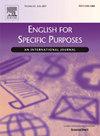为ESAP编写自定义语料库和单词列表:以地理学家英语为例
IF 2.7
1区 文学
Q1 LINGUISTICS
引用次数: 0
摘要
该研究提出了一个逐步建立专门语料库和编制技术词汇表的过程,以支持特定学术英语教学(ESAP)。认识到缺乏适合高度专业化的ESAP课程的教科书,我们构建了一个140万字的自定义语料库,以支持为地理本科学生开发基于语料库的教学材料。该语料库是根据地理学教授推荐的与学生直接相关的教科书章节和期刊文章汇编而成的。为了确保代表性,语料库与一年级文学学士地理课程保持一致。采用关键字分析和技术性相结合的方法,根据以下标准编制地理词表:(1)Sketch Engine中的简单数学关键字得分,(2)最低文档频率,(3)技术性(术语在技术词典中的包含或由特定学科专家验证)。关键词分析表明,Sketch Engine提取的关键词和多词项目绝大多数(94.24%)是技术性的,因此被纳入最终的单词列表,该列表包含507个与学生学术需求相关的地理术语。这些术语中有一半以上被纳入教材,主要是根据主题相关性选择的。本研究提出了一种基于语料库的教材设计方法,该方法简单易懂且用户友好。它为ESP从业者提供了一个实用的、方法论上健全的框架,帮助他们开发与课程一致的、定制的语料库和特定学科的教学词汇表。本文章由计算机程序翻译,如有差异,请以英文原文为准。
Compiling a custom corpus and word list for ESAP: The case of English for Geographers
The study presents a step-by-step procedure for building a specialised corpus and compiling a technical word list to support instruction in English for Specific Academic Purposes (ESAP). Recognising the lack of suitable textbooks for a highly specialised ESAP course, a custom corpus of 1.4 million words was constructed to support the development of corpus-informed teaching materials for undergraduate geography students. The corpus was compiled from textbook chapters and journal articles that geography professors recommended as directly relevant to students. To ensure representativeness, the corpus was aligned with the first-year BA geography curriculum. A combined approach of keyword analysis and technicality was used to compile a geographical word list according to the following criteria: (1) simple maths keyness score in Sketch Engine, (2) minimum document frequency, (3) technicality (the inclusion of a term in a technical dictionary or its validation by a discipline-specific expert). Keyword analysis has shown that the vast majority (94.24%) of keywords and multi-word items extracted by Sketch Engine are technical and have thus been included in the final word list, which comprises 507 geographical terms relevant to students’ academic needs. More than half of these terms were incorporated into teaching materials, primarily selected based on topic relevance. This study proposes a corpus-informed methodology for designing teaching materials that is straightforward and user-friendly. It offers a practical and methodologically sound framework for ESP practitioners seeking to develop curriculum-aligned, custom corpora and discipline-specific word lists for teaching.
求助全文
通过发布文献求助,成功后即可免费获取论文全文。
去求助
来源期刊

English for Specific Purposes
LINGUISTICS-
CiteScore
5.70
自引率
8.00%
发文量
41
审稿时长
62 days
期刊介绍:
English For Specific Purposes is an international peer-reviewed journal that welcomes submissions from across the world. Authors are encouraged to submit articles and research/discussion notes on topics relevant to the teaching and learning of discourse for specific communities: academic, occupational, or otherwise specialized. Topics such as the following may be treated from the perspective of English for specific purposes: second language acquisition in specialized contexts, needs assessment, curriculum development and evaluation, materials preparation, discourse analysis, descriptions of specialized varieties of English.
 求助内容:
求助内容: 应助结果提醒方式:
应助结果提醒方式:


